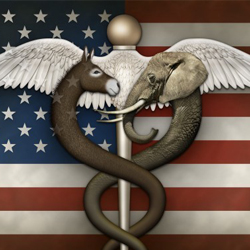Public participation is critical to the success of any medical research. Yet recruiting volunteers for trials is increasingly challenging. New research from Washington University in St. Louis suggests the widening ideological gap in the U.S. may contribute to these challenges.
Researchers found evidence that Americans approach opportunities to contribute to medical research with either a general aversion or an inclination to participate. Their findings, published in Scientific Reports, are the first to demonstrate the effect of political ideology on willingness to trust science and participate in medical research.
“Our research shows that conservatives are less willing to participate in medical research than are liberals. This difference is due, in part, to ideological differences in trust in science,” said Matthew Gabel, professor of political science in Arts & Sciences. “An ideological divide in such participation could undermine both the execution and quality of medical research. Given the uneven geographic distribution of political ideology, our findings raise important issues for recruiting study participants and developing political support for medical research.”
The problem has been brewing for decades. Long before the pandemic, Gabel and several colleagues wanted to better understand why some people were more inclined to participate in medical research than others.
“The value of research with human subjects depends critically on successful recruitment of a representative group of participants. To do that, we have to know sources of bias in who is recruited and who is likely to accept invitations to participate,” Gabel said.
The researchers analyzed survey data from the July 2014 and September 2015 waves of The American Panel Survey, a survey managed by Washington University. The survey asked questions about past and future participation in medical research-related activities, including a clinical trial for a drug, a long-term observational study, a fundraiser for medical research, and blood donation. It also included hypothetical questions about one’s willingness to donate an organ upon death and willingness to participate in an Alzheimer’s disease study.
Altogether, the analysis included 1,132 respondents. The researchers found those with conservative ideology have a systematically lower propensity to participate in medical research, due in part to their lower levels of trust in science. However, lack of trust in science only accounted for about a quarter of the effect.
“This means that if we want to reduce or eliminate the ideological difference in participation in medical research, we can do some of that by trying to raise trust in science among conservatives,” Gabel said. “But even if we are very effective at doing that, my analysis shows that conservatives will still be less likely to participate for ideological reasons unrelated to trust in science. …This can impact the [generalizability and] quality of studies because significant health conditions and behaviors—such as smoking, excessive drinking, diets, and mortality rates—differ with political ideology.”
Edited by Gary Cramer



